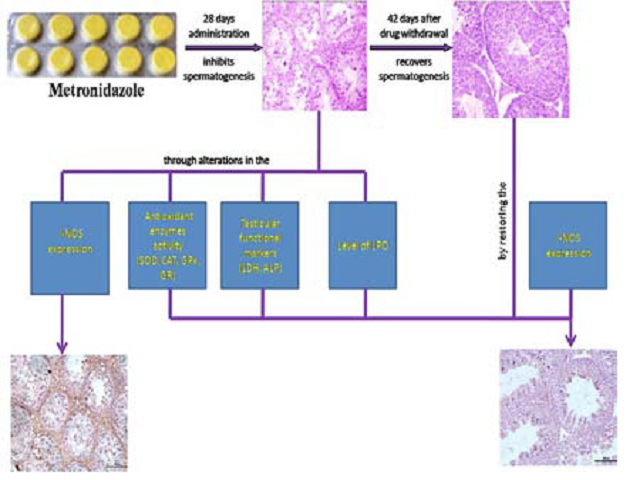Testicular Oxidative Stress and Inducible Nitric Oxide Synthase Expression following Metronidazole Administration in the Laboratory Mouse
DOI:
https://doi.org/10.5530/fra.2018.1.6Keywords:
Antioxidant Enzymes, Lipid Peroxidation, Metronidazole, Oxidative Stress, Testicular Functional Markers, TestisAbstract
Background: Metronidazole (MTZ) is a nitroimidazole derivative, widely used as an antibacterial and antiprotozoal agent. The drug causes marked impairment in the fertility of mice by affecting the testis and epididymis. The possible mechanism involved in this impairment inflicted through oxidative stress remains to be elucidated. Objective: To evaluate oxidative stress- induced effects in the testis of mice administered with MTZ. Methods: Swiss strain adult male mice were treated with low (250mg/kgBW/day) and high (500mg/kgBW/day) doses of MTZ for 28 days. Recovery study was carried out 42 days after cessation of the drug treatment. Testis was dissected out for histopathological observation, i-NOS expression by immunohistochemistry and estimations of antioxidant enzyme activities, functional markers and LPO level by spectrophotometry. All the data were analyzed statistically by one way ANOVA followed by Newman-Keul’s test and were considered significant at p < 0.05. Results: Histopathological observations of the testis revealed spermatogenic inhibition with intense i-NOS expression in the intertubular spaces following high dose of MTZ administration. Antioxidant enzyme activities (SOD, GPx and GR), functional markers (LDH and ALP) and LPO levels were significantly altered in the testis of mice administered with high dose of MTZ. The effects were reinstated similar to the controls, 42 days after the treatment withdrawal. Conclusion: The present study suggests MTZ (500mg/kgBW/day)-induced reversible direct effect in the seminiferous tubules of the testis, inflicted through oxidative stress.
Downloads
Metrics





